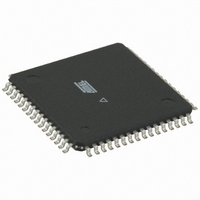ATMEGA128-16AI Atmel, ATMEGA128-16AI Datasheet - Page 297

ATMEGA128-16AI
Manufacturer Part Number
ATMEGA128-16AI
Description
IC AVR MCU 128K 16MHZ 64-TQFP
Manufacturer
Atmel
Series
AVR® ATmegar
Specifications of ATMEGA128-16AI
Core Processor
AVR
Core Size
8-Bit
Speed
16MHz
Connectivity
EBI/EMI, I²C, SPI, UART/USART
Peripherals
Brown-out Detect/Reset, POR, PWM, WDT
Number Of I /o
53
Program Memory Size
128KB (64K x 16)
Program Memory Type
FLASH
Eeprom Size
4K x 8
Ram Size
4K x 8
Voltage - Supply (vcc/vdd)
4.5 V ~ 5.5 V
Data Converters
A/D 8x10b
Oscillator Type
Internal
Operating Temperature
-40°C ~ 85°C
Package / Case
64-TQFP, 64-VQFP
For Use With
ATSTK501 - ADAPTER KIT FOR 64PIN AVR MCU
Lead Free Status / RoHS Status
Contains lead / RoHS non-compliant
Other names
Q1167170A
Available stocks
Company
Part Number
Manufacturer
Quantity
Price
Company:
Part Number:
ATMEGA128-16AI
Manufacturer:
FSC
Quantity:
7 600
Part Number:
ATMEGA128-16AI
Manufacturer:
ATMEL/爱特梅尔
Quantity:
20 000
- Current page: 297 of 385
- Download datasheet (8Mb)
Programming the
Fuse High Bits
Programming the
Extended Fuse Bits
Programming the Lock
Bits
Reading the Fuse and
Lock Bits
2467V–AVR–02/11
The algorithm for programming the Fuse High bits is as follows (refer to
Flash” on page 293
1. A: Load Command “0100 0000”.
2. C: Load Data Low Byte. Bit n = “0” programs and bit n = “1” erases the Fuse bit.
3. Set BS1 to “1” and BS2 to “0”. This selects high data byte.
4. Give WR a negative pulse and wait for RDY/BSY to go high.
5. Set BS1 to “0”. This selects low data byte.
The algorithm for programming the Extended Fuse bits is as follows (refer to
Flash” on page 293
1. A: Load Command “0100 0000”.
2. C: Load Data Low Byte. Bit n = “0” programs and bit n = “1” erases the Fuse bit.
3. Set BS2 to “1” and BS1 to “0”. This selects extended data byte.
4. Give WR a negative pulse and wait for RDY/BSY to go high.
5. Set BS2 to “0”. This selects low data byte.
Figure 139. Programming the Fuses
The algorithm for programming the Lock bits is as follows (refer to
page 293
1. A: Load Command “0010 0000”.
2. C: Load Data Low Byte. Bit n = “0” programs the Lock bit.
3. Give WR a negative pulse and wait for RDY/BSY to go high.
The Lock bits can only be cleared by executing Chip Erase.
The algorithm for reading the Fuse and Lock bits is as follows (refer to
on page 293
1. A: Load Command “0000 0100”.
2. Set OE to “0”, BS2 to “0”, and BS1 to “0”. The status of the Fuse Low bits can now be
3. Set OE to “0”, BS2 to “1”, and BS1 to “1”. The status of the Fuse High bits can now be
read at DATA (“0” means programmed).
read at DATA (“0” means programmed).
RESET +12V
RDY/BSY
PAGEL
XTAL1
DATA
BS2
XA1
XA0
BS1
for details on Command and Data loading):
WR
OE
for details on Command loading):
$40
A
for details on Command and Data loading):
for details on Command and Data loading):
DATA
C
Write Fuse Low byte
XX
$40
A
DATA
C
Write Fuse high byte
XX
“Programming the Flash” on
$40
A
“Programming the Flash”
DATA
C
ATmega128
Write Extended Fuse byte
“Programming the
“Programming the
XX
297
Related parts for ATMEGA128-16AI
Image
Part Number
Description
Manufacturer
Datasheet
Request
R

Part Number:
Description:
Manufacturer:
ATMEL Corporation
Datasheet:

Part Number:
Description:
Microcontroller with 128K bytes In-system programmable flash, 8 MHz, power supply =2.7 - 5.5V
Manufacturer:
ATMEL Corporation
Datasheet:

Part Number:
Description:
IC AVR MCU 128K 16MHZ 5V 64TQFP
Manufacturer:
Atmel
Datasheet:

Part Number:
Description:
IC AVR MCU 128K 16MHZ 5V 64-QFN
Manufacturer:
Atmel
Datasheet:

Part Number:
Description:
IC AVR MCU 128K 16MHZ COM 64-QFN
Manufacturer:
Atmel
Datasheet:

Part Number:
Description:
IC AVR MCU 128K 16MHZ 64-TQFP
Manufacturer:
Atmel
Datasheet:

Part Number:
Description:
IC AVR MCU 128K 16MHZ IND 64-QFN
Manufacturer:
Atmel
Datasheet:

Part Number:
Description:
MCU AVR 128KB FLASH 16MHZ 64TQFP
Manufacturer:
Atmel
Datasheet:

Part Number:
Description:
MCU AVR 128KB FLASH 16MHZ 64QFN
Manufacturer:
Atmel
Datasheet:

Part Number:
Description:
MCU AVR 128KB FLASH 16MHZ 64TQFP
Manufacturer:
Atmel
Datasheet:

Part Number:
Description:
MCU AVR 128KB FLASH 16MHZ 64QFN
Manufacturer:
Atmel
Datasheet:











